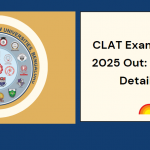Are you in Class 11 and aiming to crack the CLAT (Common Law Admission Test)? This is the perfect time to plan your academic path. While CLAT doesn’t require a specific stream or subject combination, picking the right subjects can give you an edge. Let’s explore the best subjects for CLAT preparation and how they can help you succeed in the exam.
Understanding the CLAT Exam Structure
Before selecting your subjects, it’s important to know what CLAT tests you on. The exam has five major sections:
- English Language: Reading comprehension, grammar, and vocabulary.
- Current Affairs & General Knowledge: Recent events, history, geography, and key general knowledge topics.
- Legal Reasoning: Application of legal principles, rules, and problem-solving.
- Logical Reasoning: Analytical reasoning, puzzles, and critical thinking.
- Quantitative Techniques: Basic math and data interpretation (up to the 10th-grade level).
As you can see, CLAT covers a broad range of skills and knowledge, and your Class 11 subject choices can influence how well you prepare for these areas.
Best Subjects for CLAT in Class 11
1. Political Science (Highly Recommended)
- Why It’s Great for CLAT: Political Science helps you understand the Constitution, governance, and legal systems.
- What You’ll Learn: Political ideologies, rights, duties, and international relations.
- Bonus: This subject provides valuable insights into law, which directly helps in the Legal Reasoning section.
2. English (Highly Recommended)
- Why It’s Great for CLAT: English is essential for scoring well in the Reading Comprehension and English Language sections.
- What You’ll Learn: Literature, text analysis, vocabulary, and grammar.
- Bonus: Strong English skills also help in Legal Reasoning, where reading and understanding complex arguments is key.
3. History (Recommended)
- Why It’s Great for CLAT: History enhances your understanding of Current Affairs and General Knowledge, particularly regarding historical events and constitutional developments.
- What You’ll Learn: Ancient, medieval, and modern history, including legal history.
- Bonus: History develops critical thinking skills that are useful for logical reasoning.
4. Economics (Helpful for Logical Reasoning and GK)
- Why It’s Great for CLAT: Economics improves your analytical and problem-solving skills, crucial for Logical Reasoning and General Knowledge.
- What You’ll Learn: Microeconomics, macroeconomics, and economic trends.
- Bonus: Economics sharpens your ability to think critically and solve problems—key skills for the CLAT exam.
5. Mathematics (If You’re Comfortable)
- Why It’s Great for CLAT: CLAT includes basic math in the Quantitative Techniques section, and studying math in Class 11 can help you excel.
- What You’ll Learn: Algebra, geometry, statistics, and data interpretation.
- Bonus: Math improves logical reasoning and helps you tackle the Quantitative Techniques section confidently.
How to Decide Which Subjects Are Best for You
Here’s how you can decide which subject combination works best for you:
- Interest in Law: If you’re passionate about law and governance, Political Science and History are great choices.
- Strong in Language: If you enjoy reading and writing, English is a must.
- Comfort with Numbers: If you’re good at math, choosing Mathematics will give you an edge in Quantitative Techniques.
Stream Choices: Arts, Commerce, or Science?
- Arts/Humanities: This stream is ideal for law aspirants. Subjects like Political Science, History, and English align well with CLAT.
- Commerce: If you’re interested in business or economics, Commerce with Economics and Mathematics can help with logical reasoning and quantitative techniques.
- Science: While science subjects don’t directly align with CLAT, you can still crack the exam with strong preparation. Just be sure to manage both streams effectively.
Start Early, Stay Focused
Choosing the right subjects in Class 11 helps build a strong foundation for CLAT 2025, but success ultimately depends on your dedication and preparation. Pick subjects that interest you and complement your CLAT study routine. Make a habit of reading newspapers, following current events, and taking mock tests regularly.
By starting early and staying focused, you’ll be well-prepared to ace CLAT when the time comes!



